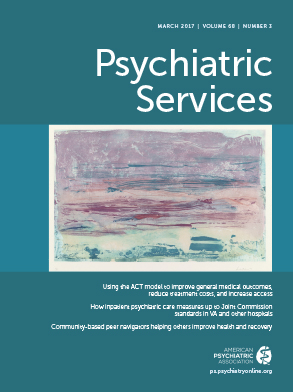TO THE EDITOR: In our article posted online January 17, we analyzed changes in insurance coverage and treatment utilization for individuals with mental illness and substance use disorders, comparing 2011–2013 versus 2014 data from the National Survey of Drug Use and Health (NSDUH) (
1). Key coverage provisions of the Affordable Care Act (ACA), especially Medicaid expansion and health insurance marketplaces, were implemented in 2014. However, the 2014 interviews may not fully capture changes occurring under the ACA, especially for measures with a 12-month recall period. Including more recent data, we have now compared the 2014–2015 period with 2011–2013, providing a longer time frame in which to evaluate evolving trends.
Previously, we found substantial decreases in the uninsured rate and increases in Medicaid enrollment in 2014 in the subgroups with mental illness and substance use disorders. Changes were largest among low-income individuals (≤200% of the federal poverty level). In our updated analysis, we find the uninsured rate further decreased and Medicaid enrollment increased for both groups. [These results are shown in the first table of the online supplement.] For example, including 2015, the uninsured rate decreased by 6.8 percentage points (p<.01) among individuals with mental illness, and Medicaid enrollment increased by 4.8 percentage points (p<.01)—larger than the previously reported changes of 5.4 percentage points and 3.6 percentage points, respectively.
We previously reported that mental health treatment utilization increased by 2.1 percentage points. Surprisingly, when including 2015 data, this difference is eliminated (.9 percentage points, p=.21), indicating that gains in treatment utilization were not sustained in 2015. [See second table of the online supplement.] We previously reported no change in use of treatment for substance use disorders in 2014, and this remained the case in 2015, indicating no improvement in treatment utilization.
Our findings related to setting and payment for treatment remained largely unchanged when including 2015 data, with a few exceptions. Including 2015, we find that among low-income individuals receiving treatment for substance use disorders, use of residential rehabilitation decreased (9.6 percentage points, p=.02) and payment by Medicaid increased (8.4 percentage points, p=.03). For low-income individuals with mental illness who received treatment, we find reduced self-payment (4.1 percentage points, p=.02) and increased payment by private insurance (3.5 percentage points, p=.04).
We note three limitations. First, in 2015 the NSDUH changed its screening for use of inhalants, methamphetamine, prescription pain relievers, tranquilizers, stimulants, and sedatives but not for use of alcohol and marijuana (the two most commonly reported substances) (
2). Although the estimated prevalence of substance use disorders was very similar in 2015 and 2014, changes in sample composition could reduce comparability of substance use disorder estimates. Second, the NSDUH does not measure medication-assisted treatment for substance use disorders. Third, the public-use NSDUH does not include state identifiers, so we could not isolate the effect of states that opted for Medicaid expansion.
Overall, we find continued progress in reducing the uninsured rate among individuals with mental illness and substance use disorders in 2015 and some signs of reduced financial burden among those who received treatment in the year. However, coverage gains have not translated into increased service utilization overall. Investigating barriers to care, such as limited supply of providers and coverage restrictions in insurance plans, is an important priority for research.

